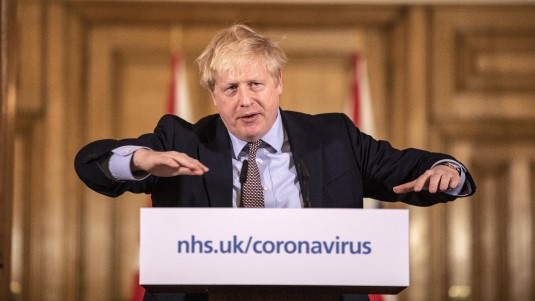
Firstly, polling electoral intentions are utterly pointless - a point the article above concedes. It isn't just that elections are now postponed, but also the moment we're living in is fleeting and highly unusual. Voting intentions today aren't voting intentions four years hence, though it is beyond likely the politics then are still going to be dominated by this crisis and the subsequent recovery. Also, Labour isn't figuring in the wider political imaginary - apart from scabby MPs coveting the settling of scores. This isn't because Labour haven't been taking to the airwaves making their criticisms known as Jeremy Corbyn and John McDonnell both have ventured powerful criticisms of the government's handling that echo points long made by health campaigners and NHS workers. It is, sadly, because most people have tuned out from what they're saying. The double whammy of election defeat and the stupidly, unnecessarily long leadership contest has simply ruled Corbyn out as a contender. No doubt this will change with the election of a new leader next week, but in the mean time can't do anything but depress Labour's numbers.
The second explanation is so obviously obvious even a politics prof would get it. In times of national emergency, there is a tendency for people to rally around the government because, well, there is nothing else they can do. We see it in country after country, the support for incumbent leaders have gone up. Even Donald Trump, whose handling of the Coronavirus crisis has proven spectacularly incompetent and has doomed tens if not hundreds of thousands to otherwise avoidable deaths has enjoyed a bounce in approval ratings. Hence the criticisms, of which there are legion, that can be made about the government completely bounce off or do not find a mass audience.
Think about it like this. Facing an invisible adversary individuals are powerless against, the avenues of agency are radically narrowed. Abiding by the letter of the government's advice is an obvious means of doing something. And as someone who's been out everyday during the crisis to get in my state-sanctioned exercise, its effect has proven striking. Virtually no cars on the roads. Very few people in our local park. But staying home is not enough. As police reports suggest, we've descended into a nation of curtain twitchers with neighbour informing on neighbour, and suspicious people (i.e. anyone happening to stroll by) sparking unease and dread across the land. The likes of Derbyshire Police should be mocked for their over-the-top scouring of the Dales and Peak District by drone, but they're sublimating the eye-spy proclivities of millions of scared and frustrated people. The stymied agency does have its positives though, such as the public round of applause NHS workers received on Thursday, the setting up of mutual aid organisations, and the hundreds of thousands who've volunteered in response to the government's call. Things have got so bad that even Twitter is bearable, being used for good-natured bants and a means of whiling away the hours positively. And this in turn reflects on the government. As the state is the legitimised institutional expression of country and therefore representative of the "national community", it condenses the hopes of beating this disease and finds projected onto it what you might call aspirational agency - what its populace would like to do, but can only effect through collective effort. In this case, what the state is apparently doing on their behalf.
This cannot persist, and will not persist. China and Italy have already seen outbreaks of violent unrest, and while it would be stupid to suppose the UK has this to look forward to with any sense of inevitability, these polling figures won't last forever. For as long as the emergency is perceived, unless the government does anything else egregiously and obviously stupid most will continue to give them the benefit of the doubt. What happens when normality arrives, and how the Tories are going to try and turn the clock back, this will be the crucial time. Therefore it's not worth paying any mind to polling until then, except as a curio for future historians.
Image Credit
1 comment:
Well, agreed, but it still looks dreadful. Johnson's handling of this crisis has been little short of pathetic - and the delays and ambiguities will undoubtedly lead to avoidable deaths. Obviously we will and should all focus attention on the ending of this crisis (and then the enormous economic crisis that will follow), but the part played by Johnson and his minions and followers should not be forgotten.
Time for the new Labour leader to (indeed) offer critical support to the government strategy, but offer hope too that if there is another pandemic, a more competent hand will be on the wheel.
Post a Comment